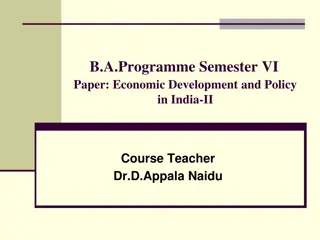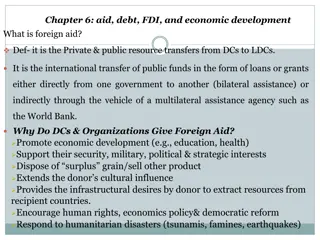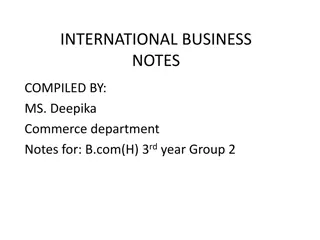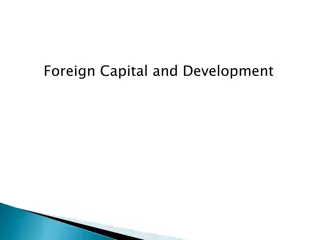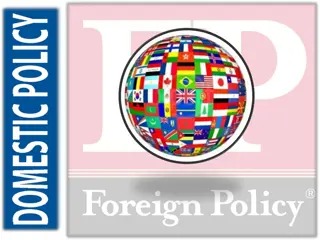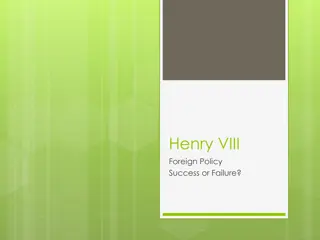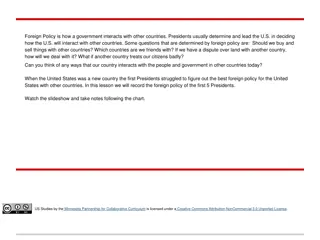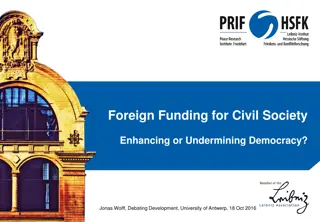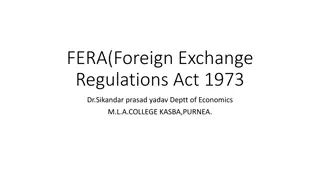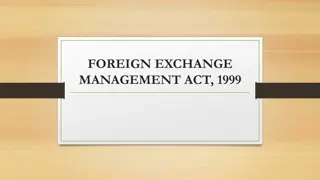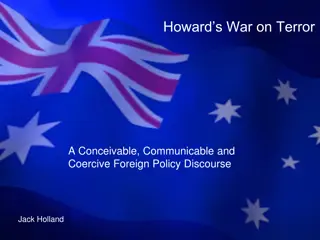
German Parliament's Role in Foreign Policy Decision-Making
Explore the nuanced role of the German Parliament in shaping foreign policy, including its functions, limitations, and areas of influence. From shedding light on government policy to budget approval and military deployment mandates, delve into the complexities of parliamentary involvement in international affairs.
Download Presentation

Please find below an Image/Link to download the presentation.
The content on the website is provided AS IS for your information and personal use only. It may not be sold, licensed, or shared on other websites without obtaining consent from the author. If you encounter any issues during the download, it is possible that the publisher has removed the file from their server.
You are allowed to download the files provided on this website for personal or commercial use, subject to the condition that they are used lawfully. All files are the property of their respective owners.
The content on the website is provided AS IS for your information and personal use only. It may not be sold, licensed, or shared on other websites without obtaining consent from the author.
E N D
Presentation Transcript
MAKING FOREIGN POLICY DECISIONS Hertie School of Governance Trends of German Foreign Policy September 17, 2022
Judiciary NGOs Media Legislative Citizenry Supranational Level Global Economy (Political) Science Executive
PARLIAMENT I Parliament is concerned with three aspects of the foreign policy process: Shedding light on Government policy: Hearings, plenary debates and resolutions In extraordinary cases: Parliamentary Enquiry Committee Mandating military deployment: Exclusive right of parliament, as enshrined in the Parlamentsbeteiligungsgesetz Article 24 Basic Law: With a view to maintaining peace, the Federation may enter into a system of mutual collective security; in doing so it shall consent to such limitations upon its sovereign powers as will bring about and secure a lasting peace in Europe and among the nations of the world. Budget approval (on a rolling basis) Gateway for indirect policy-making by Parliament
PARLIAMENT II Parliamentary access is weak: No access to intelligence reports (although oral intelligence briefings upon request) No access to diplomatic cables (although oral briefings upon request) No genuine law-making competence of the Standing Committees (Foreign Affairs; Defense; Economic Cooperation and Development; European Affairs) On the upside: increasing number of field visits, parliamentary group exchange and visits by foreign dignitaries to Berlin
PARLIAMENT III Parliamentary initiative and control is weak: No law-making competence of the Standing Committees (Foreign Affairs; Defense; Economic Cooperation and Development; European Affairs) Parliamentary resolutions are non-binding ( We call upon the government ). Basis: Article 32 Basic Law: Relations with foreign states shall be conducted by the Federation. Mandates for military deployment abroad can only be adopted or rejected, but not amended (although informal processes de facto allow so) No confirmation hearings for senior civilian and military personnel (experience from the Weimar Republic )
PARLIAMENT IV Special Case I: Parliamentary Oversight Panel (PKGr) Responsible for scrutiny of intelligence services at Federal level Panel can demand the submission of detailed information by the Government (general activities and on operations of particular importance) Composed of members from all parliamentary groups (Very) Special Case II: G10-Commission Takes decisions on the necessity and admissibility of restrictions on the privacy of correspondence, posts and telecommunications pursuant to Article 10 of the Basic Law. Benchmark: protection of the free democratic basic order or the existence of security of the Federation or of a Land)
PARLIAMENT V Special Case III: Parliamentary Enquiry Committee Article 44 Basic Law enshrines the parliamentary right to establish a special committee by which Parliament serves as both court and prosecutor. The code of criminal procedure applies. Precondition: 25% of Parliament votes in favor of establishing an Enquiry Committee Recent examples: NSA-BND Enquiry Committee; Air Strike in Kunduz in September 2009.
PARLIAMENT VI Special Case IV: European Policy Matters concerning the European Union must be broad to the attention of Parliament comprehensively and to the earliest possible moment (Article 23 Basic Law) Parliament is invited to issue a statement on legal acts on the European level that shall be taken into account by the Government Chancellor gives Government Policy Statement to Parliament immediately before European Council.
GOVERNMENT I Principle I: Federf hrung (lead management) Very sensitive matter in every bureaucracy Humanitarian aid vs. development aid; defense procurement vs. defense export; NATO as a security actor and NATO as a political actor Conflicting interests: wanting to be in charge vs. being able to pass the buck when things go bad. Examples: Afghanistan withdrawal / extraction of local staff; German frigate port call to China Critics: Prevents whole-of-government approach and fosters inter-agency encapsulation and silo mentality Especially difficult if ministries are under the leadership of different parties
GOVERNMENT II Principle II: Richtlinienkompetenz Article 65 Basic Law: The Federal Chancellor shall determine and be responsible for the general guidelines of policy. Although being enshrined in the Constitution, the Richtlinienkompetenz solely rests upon political legitimacy and the balance of power within the executive. Chancellor Merkel preferred silent Richtlinien- kompetenz (e.g. Nawalny case)
GOVERNMENT III Principle III: Ressortprinzip Article 65 Basic Law: The Federal Chancellor shall determine and be responsible for the general guidelines of policy. Within these limits each Federal Minister shall conduct the affairs of his department independently and on his own responsibility. Two diverging trends: Decentralization. The buck does not stop in the Chancellery. Question: Should the government headquarter really bear responsibility for intelligence oversight? Centralization. A growing foreign policy spectrum is determined by the Chancellery (European affairs, transatlantic relations, Ukraine, for a while: Libya and Sahel, Western Balkans)
BUREAUCRACY CHAIN OF COMMAND Minister Strategic Level State Secretary Coordination level Operational Level Director-General Group Leader Coordination Level Unit Leader Policy Level Escalation Ladder Policy Level Desk Officer
Accelerators: time constraints, work spirit, policy quality GOVERNMENT IV The lead ministry formulates a draft policy decision Foreign Office Lead management ministry decides on who should be involved when and to what extent. Defense If necessary: Issue is escalated up the ladder Chancellery Development and Economic Cooperation Loop of Reconcilement until consensus has been found
JUDICIARY I Supreme Court follows a dual-track approach: Empowering the Legislative as the gatekeeper for military means Providing the Executive with sufficient leeway to carry out its foreign policy objectives (Flick ruling 1984) Supreme Court as power broker between Executive and Legislative Increasing actorness and law diplomacy Growing challenge: Progress of European integration while preserving the core of national sovereignty and thus statehood
CASE STUDY: GUIDELINES INDO-PACIFIC I Foreign Office comes up with the idea that we need a strategy on the Indo- Pacific: Strategic epicenter of the 21st century Significant importance for international security (SCS, Taiwan, etc.) Significant economic interests (Strait of Malacca, etc.) Foreign Office forms an inner-ministerial working group to brainstorm ideas for a White Book : Talks with NGOs, scholars and pundits Talks with Parliament Talks with strategic partners (EU, USA, Japan, etc.) Parallel: Other Ministries inform their leadership
CASE STUDY: GUIDELINES INDO-PACIFIC II Foreign Office presents a first draft to all concerned ministries Complex formation of will starts within the concerned ministries. First round of feedback: usually up the ladder to group leader level Foreign Office seeks to reconcile positions, offers compromise language, tries to defend its core interests (e.g. strong language on human rights) Second round of formation of will within the concerned ministries, talks are kicked up the ladder After final compromise has been reached: Cabinet approves the White Book Parliament comments the White Book in hearings and plenary debate
REVIEW OF STATUS QUO Afghanistan withdrawal has fueled debate whether Germany s foreign policy decision-making process is adequately suited to handle high-stakes, high-intensity challenges. National Security Council? Low level of influence by Parliament increasingly raises eye-brows. Should the desk officer have more influence on Germany s role in the world than an elected representative?
KEY FINDINGS I I. Legislative: Exclusive competence to mandate Bundeswehr operations abroad Comparably tight control of budget, even after it has been formally passed Comparably low control of both strategic decisions and day-to-day policy II. Executive: Enjoys great leeway in executing foreign policy Extensive scope of core area of executive self-responsibility III. Judiciary: Serves as power broker Increasing Actorness ( Law Diplomacy )
Q&A I am looking forward to any questions or comments that you may have.



